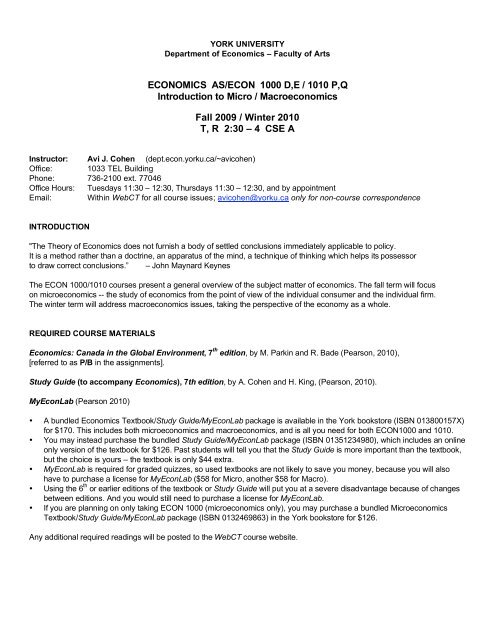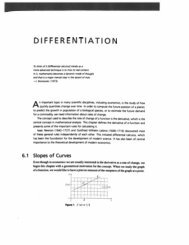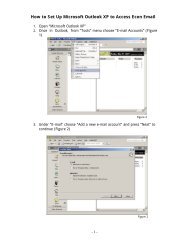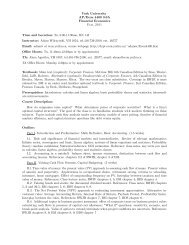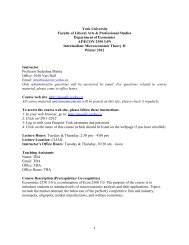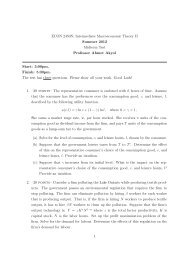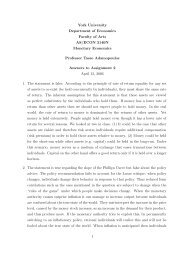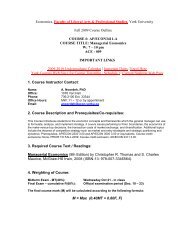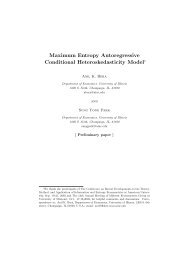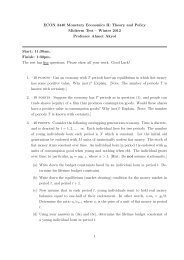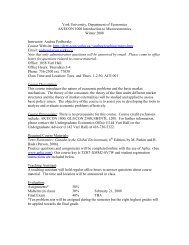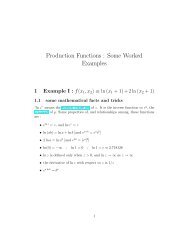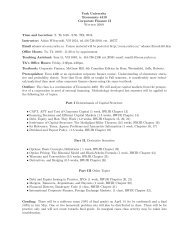Introduction to Microeconomics AP/ECON 1000 3.0DF
Introduction to Microeconomics AP/ECON 1000 3.0DF
Introduction to Microeconomics AP/ECON 1000 3.0DF
Create successful ePaper yourself
Turn your PDF publications into a flip-book with our unique Google optimized e-Paper software.
YORK UNIVERSITYDepartment of Economics – Faculty of Arts<strong>ECON</strong>OMICS AS/<strong>ECON</strong> <strong>1000</strong> D,E / 1010 P,Q<strong>Introduction</strong> <strong>to</strong> Micro / MacroeconomicsFall 2009 / Winter 2010T, R 2:30 – 4 CSE AInstruc<strong>to</strong>r: Avi J. Cohen (dept.econ.yorku.ca/~avicohen)Office: 1033 TEL BuildingPhone: 736-2100 ext. 77046Office Hours: Tuesdays 11:30 – 12:30, Thursdays 11:30 – 12:30, and by appointmentEmail: Within WebCT for all course issues; avicohen@yorku.ca only for non-course correspondenceINTRODUCTION"The Theory of Economics does not furnish a body of settled conclusions immediately applicable <strong>to</strong> policy.It is a method rather than a doctrine, an apparatus of the mind, a technique of thinking which helps its possessor<strong>to</strong> draw correct conclusions.” – John Maynard KeynesThe <strong>ECON</strong> <strong>1000</strong>/1010 courses present a general overview of the subject matter of economics. The fall term will focuson microeconomics -- the study of economics from the point of view of the individual consumer and the individual firm.The winter term will address macroeconomics issues, taking the perspective of the economy as a whole.REQUIRED COURSE MATERIALSEconomics: Canada in the Global Environment, 7 th edition, by M. Parkin and R. Bade (Pearson, 2010),[referred <strong>to</strong> as P/B in the assignments].Study Guide (<strong>to</strong> accompany Economics), 7th edition, by A. Cohen and H. King, (Pearson, 2010).MyEconLab (Pearson 2010)• A bundled Economics Textbook/Study Guide/MyEconLab package is available in the York books<strong>to</strong>re (ISBN 013800157X)for $170. This includes both microeconomics and macroeconomics, and is all you need for both <strong>ECON</strong><strong>1000</strong> and 1010.• You may instead purchase the bundled Study Guide/MyEconLab package (ISBN 01351234980), which includes an onlineonly version of the textbook for $126. Past students will tell you that the Study Guide is more important than the textbook,but the choice is yours – the textbook is only $44 extra.• MyEconLab is required for graded quizzes, so used textbooks are not likely <strong>to</strong> save you money, because you will alsohave <strong>to</strong> purchase a license for MyEconLab ($58 for Micro, another $58 for Macro).• Using the 6 th or earlier editions of the textbook or Study Guide will put you at a severe disadvantage because of changesbetween editions. And you would still need <strong>to</strong> purchase a license for MyEconLab.• If you are planning on only taking <strong>ECON</strong> <strong>1000</strong> (microeconomics only), you may purchase a bundled <strong>Microeconomics</strong>Textbook/Study Guide/MyEconLab package (ISBN 0132469863) in the York books<strong>to</strong>re for $126.Any additional required readings will be posted <strong>to</strong> the WebCT course website.
AS/<strong>ECON</strong> <strong>1000</strong> D,E / 1010 P,Q 2Fall 2009/Winter 2010FINAL GRADEThe composition of the final grade is:<strong>1000</strong> Fall 2009 MarksOnline Quizzes 20% Throughout the term 120Test #1 15% (in class) Thursday, Oc<strong>to</strong>ber 8, 2009 90Test #2 15% (in class) Thursday, November 12, 2009 90Final Exam 50% December 10 - 23, 2009 300100% 6001010 Winter 2010 MarksOnline Quizzes 20% Throughout the term 120Test #1 15% (in class) Thursday, February 4, 2010 90Test #2 15% (in class) Thursday, March 11, 2010 90Final Exam 50% April 7 - 23, 2010 300100% 600You are responsible for all material covered in lectures and all assigned pages in the textbook and questions inthe Study Guide. Do not do end of chapter questions in the textbook. Quizzes are explained below.COURSE WORKWhile tests and the final exam must be taken in person, it is your choice whether <strong>to</strong> attend the lectures in-class or online.There will be three in-class lecture hours per week. Lecture notes (in the form of PowerPoint slides) will be available at least24 hours in advance of class on the course website (http://webct.yorku.ca). Students attending lectures should print out acopy of the lecture notes and bring them <strong>to</strong> class, as the pace of lectures will presume you have the notes in front of you.All lecture content will be captured digitally (including PowerPoint, audio, document camera) and made available on thecourse website within one day of the lecture.The in-class tests and final exams consist of multiple choice (MC) questions and short answer problems (S<strong>AP</strong>). In addition,students should answer the assigned questions in each Study Guide chapter (you may skip all True/False questions)corresponding <strong>to</strong> the chapters in the Parkin/Bade textbook. These will not be graded and will not directly affect your grade.However, the importance of doing the Study Guide questions cannot be overemphasized. Next <strong>to</strong> the lectures, working outthe answers <strong>to</strong> the questions in the Study Guide is the most important preparation for tests and exams. You will not passtests and exams if you cannot answer the Study Guide questions.One of the dangers of a course where you do not have <strong>to</strong> physically attend lectures, is that without the discipline of coming<strong>to</strong> class, you may fall behind in your reading and studying. In most university courses, but in Economics in particular, that isa recipe for disaster, as last minute cramming does not work. The failure rate on the first term test is typically 25% or higher,because students do not take this advice. To help prevent this outcome, I will have online quizzes throughout the term(worth 20% of your final course grade) that must be completed by specific dates. Quizzes and other online study aides willbe delivered through MyEconLab. More quiz details will be available once the course starts.Read the Study Guide's "<strong>Introduction</strong>" for advice on studying if you want <strong>to</strong> increase your chances of earning a higher grade.I consider my job <strong>to</strong> be helping you succeed in doing well in the course. However, that will take a serious commitment fromyou. <strong>ECON</strong> <strong>1000</strong> is a difficult course with high drop/failure rates. To do well, you should expect <strong>to</strong> spend at least 2 hoursstudying outside the classroom for every hour of lecture. That means a minimum of 5 hours per week studying for this coursealone. If you are taking 5 courses and working 20 hours a week or more, experience shows you are likely <strong>to</strong> fail this course.Make sure you have time <strong>to</strong> do well. Tests and exams do not focus on recall of information, but on application of concepts <strong>to</strong>different situations. That is also why working practice problems in the Study Guide and using MyEconLab are so important.Compared <strong>to</strong> some other sections of the course, I tend <strong>to</strong> cover more chapters in the textbook and many studentsreport that they work harder in my sections. I make no apology – you will learn more for the same tuition dollars thanwill students in those other sections. If that does not appeal <strong>to</strong> you, consider switching <strong>to</strong> another section.
AS/<strong>ECON</strong> <strong>1000</strong> D,E / 1010 P,Q 3Fall 2009/Winter 2010LECTURE / TEST RULES AND ACADEMIC HONESTYPlease silence all cell phones and pages before entering the lecture hall.Students using notebook/netbook computers will be required <strong>to</strong> sit in designated areas.For tests and exams, calcula<strong>to</strong>rs, digital dictionaries, cell phones, or any electronic devices are not allowed.All such devices as well as all books, papers, knapsacks, and briefcases must be left at the front or sides of the lecture hall.Anyone caught with electronic devices will be charged with Academic Dishonesty. The only items you may have at yourseat are pens, pencils, student ID, purses and coats.Cheating and plagiarism are serious offences, which carry severe penalties. All students are expected <strong>to</strong> go <strong>to</strong>the Academic Integrity web site (http://www.yorku.ca/acadinte/students/index.htm), <strong>to</strong> read the Senate Policy onAcademic Honesty, and <strong>to</strong> complete the Academic Integrity Tu<strong>to</strong>rial (http://www.yorku.ca/tu<strong>to</strong>rial/academic_integrity/).Since calcula<strong>to</strong>rs are not allowed on tests and exams, I suggest you do all Study Guide and MyEconLab problemswithout using a calcula<strong>to</strong>r, so you get used <strong>to</strong> using a pencil only.MAKE-UP POLICYNo permission is ever given <strong>to</strong> a student <strong>to</strong> write a test or exam in advance of its scheduled date.A student who misses a test will be allowed <strong>to</strong> write a make-up test only if both of the following conditions are met:1) the student notifies me (my email only within WebCT) or the Department of Economics ((416) 736-5083)in advance that the test will be missed;2) the student provides a completed Registrar’s Office Attending Physician’s Statement showing aphysical incapability of writing the test.Any other forms of doc<strong>to</strong>r’s note, especially one stating simply that “The student was seen in my office” arenot acceptable. Students who miss a test and do not meet both conditions (advance notification andcompleted Registrar’s Office Attending Physician’s Statement) receive a grade of zero.Students who miss either term test and meet both of the conditions above, will write the make-up test which is heldduring class time, one week after Test 2 (for AS/<strong>ECON</strong> <strong>1000</strong>, Thursday, November 19, 2009, 2:30 pm; forAS/<strong>ECON</strong> 1010, Thursday, March 18, 2010, 2:30 pm). There is only one comprehensive make-up test each term,covering the material in both Tests 1 and 2. You must be available at these (class) times <strong>to</strong> write a make-up test.No other times will be scheduled.Students who miss the final exam will only be allowed <strong>to</strong> write a deferred exam if they complete the DeferredStanding Agreement Form and provide a completed Registrar’s Office Attending Physician’s Statement.Make-up tests and deferred exams are only for students who missed the original test or exam. No student isever allowed <strong>to</strong> write a make-up test or deferred exam in order <strong>to</strong> improve a score from the original test/exam.To ensure that all students are familiar with these rules, you must complete “Quiz Zero” within MyEconLab.While this quiz is not graded, you will not be able <strong>to</strong> access the lecture notes or receive Test marks until youcomplete Quiz Zero with a perfect score.IMPORTANT DATESSeptember 24, 2009November 6, 2008January 19, 2010March 8, 2010Last date <strong>to</strong> enrol in AS/<strong>ECON</strong> <strong>1000</strong> without the permission of the instruc<strong>to</strong>rLast date <strong>to</strong> drop AS/<strong>ECON</strong> <strong>1000</strong> without receiving a gradeLast date <strong>to</strong> enrol in AS/<strong>ECON</strong> 1010 without the permission of the instruc<strong>to</strong>rLast date <strong>to</strong> drop AS/<strong>ECON</strong> 1010 without receiving a gradeIf you fail the first term test in either course, and cannot significantly increase the time you spend studyingEconomics, it may be in your best interest <strong>to</strong> drop the course before the deadline for not receiving a grade.
AS/<strong>ECON</strong> <strong>1000</strong> D,E / 1010 P,Q 4Fall 2009/Winter 2010RELIGIOUS OBSERVANCE POLICYYork University is committed <strong>to</strong> respecting the religious beliefs and practices of all members of the community, and makingaccommodations for observances of special significance <strong>to</strong> adherents. Should any of the dates specified for in-class testsor examinations pose such a conflict for you, you are responsible for contacting me at least 2 weeks in advance. To arrangean alternative date or time for a final exam scheduled in the formal examination periods (December and April), studentsmust complete an Examination Accommodation Form (http://www.registrar.yorku.ca/pdf/exam_accommodation.pdf).TA OFFICE HOURSTeaching assistants will be available in 1098 Vari Hall <strong>to</strong> answer questions about course material and Study Guidequestions. The TA office hours will be announced in lecture and posted on the website. The best way <strong>to</strong> get questionsanswered by TAs is <strong>to</strong> post them <strong>to</strong> the WebCT discussion forum (see below).TECHNOLOGYEven if you attend every lecture in person, <strong>to</strong> take this course you must have access <strong>to</strong> a computer and the web.You will need <strong>to</strong> log on at least every other day, and ideally, every day.The two major technologies used are the WebCT Course Management System and MyEconLab for quizzes.Complete instructions for accessing this course’s WebCT website are athttp://www.yorku.ca/fsc/WebCT/student/quickstart.htm.To use WebCT <strong>to</strong> access your courses, you must first activate your WebCT service.This is an one-time only process; your WebCT service will be active until you deactivate it or leave York.1. Go <strong>to</strong> Manage My Service page at http://www.yorku.ca/computing/students/accounts/mmsservices.html2. Log in <strong>to</strong> Passport YORK as directed.3. Select Activate New Service, and then select WebCT from the list of your available services.4. Follow the instructions <strong>to</strong> select your WebCT password.5. To exit, click the Logout but<strong>to</strong>n at the upper right corner.Your WebCT account will be active in approximately 30 minutes. Your WebCT username is the username you used<strong>to</strong> log in<strong>to</strong> Passport YORK. Your WebCT password, as selected during the activation process, may be the same ordifferent from your Passport YORK password. Ensure you remember your WebCT password. You may changeeither your Passport YORK or WebCT password with Manage My Services.To access your courses, open http://webct.yorku.ca in your browser. Fill out the username and password fields asappropriate and click Log In. Once you’ve successfully logged in, your personal myWebCT page will be displayed.The login is case-sensitive. Ensure you are not typing uppercase when you think you’re typing lowercase.Usernames are always lowercase.If you have technical problems with WebCT, I cannot help.You must contact Computing and Network Services (CNS) Helpdesk at 416-736-5800 or helpdesk@yorku.ca.LET’S GOIf you don’t learn a lot of Economics, or find this course interesting or enjoyable, then I’m not doing my job. I loveteaching this course, and consider it my responsibility <strong>to</strong> help you <strong>to</strong> do well. Learning Economics means working hard,and this course will be hard work. But if you are willing <strong>to</strong> put in the time, I will do everything I can <strong>to</strong> help you succeed.If you have questions in lecture, ask them. If you have suggestions for improving the course, please let me know.What you will get out of this course, as what you will get out of your University experience in general, dependsentirely on what you put in<strong>to</strong> it.
AS/<strong>ECON</strong> <strong>1000</strong> D,E / 1010 P,Q 5Fall 2009/Winter 2010LECTURE SCHEDULE AND ASSIGNMENTS<strong>Introduction</strong> <strong>to</strong> <strong>Microeconomics</strong> AS/<strong>ECON</strong> <strong>1000</strong> 3.0 D,E Fall 2009WEEK OF TOPIC READINGASSIGNMENTSTUDY GUIDEASSIGNMENTSeptember10Administrative <strong>Introduction</strong>Course OutlineSeptember15What is Economics?: Theory,His<strong>to</strong>ry, Measurement, PolicyP/B Ch. 1; Ch. 1Appendix, Math NoteCh. 1: MC All S<strong>AP</strong> AllAppendix: MC All S<strong>AP</strong> AllSeptember22The Emergence of theMarket Economy:The Economic ProblemP/B Ch. 2 (31-43 only) Ch. 2: MC 1-23 S<strong>AP</strong> 1-9Part 1: Problem All MC AllSeptember29Overview NeoclassicalEconomic Theory:Demand & SupplyP/B Ch. 3 Ch. 3: MC All S<strong>AP</strong> AllOc<strong>to</strong>ber6Elasticity P/B Ch. 4 Ch. 4: MC All S<strong>AP</strong> AllTEST 1 – In Class – Thursday 8 Oc<strong>to</strong>berOc<strong>to</strong>ber20Efficiency & Equity;Markets in ActionP/B Chs. 5 and6 (129-140 only)Ch. 5: MC All S<strong>AP</strong> AllCh. 6: MC 1-15 S<strong>AP</strong> 1-7Part 2: Problem a-d MC 2-17Oc<strong>to</strong>ber27Utility & Demand P/B Ch. 8 (182-193 only) Ch. 8: MC 1-23 S<strong>AP</strong> AllNovember3Possibilities, Preferences andChoicesP/B Ch. 9 Ch. 8: MC All S<strong>AP</strong> AllPart 3: Problem All MC AllNovember10Organizing Production;Output & CostsP/B Chs. 10 (227-232only) and 11Ch. 10: MC 1-10, S<strong>AP</strong> 1-4Ch. 11: MC All S<strong>AP</strong> AllTEST 2 – In Class – Thursday 12 NovemberNovember17Perfect Competition P/B Ch. 12 Ch. 12: MC All S<strong>AP</strong> AllNov. 24Monopoly;Monopolistic CompetitionP/B Chs. 13 and 14(323-329 only)Ch. 13: MC All S<strong>AP</strong> AllCh. 14: MC 1-19 S<strong>AP</strong> 1-5December1Oligopoly;ExternalitiesP/B Chs. 15 (341-3,346-54 only) and 16Ch. 15: MC 1-4, 9-17 S<strong>AP</strong> 1-3, 7-8Part 4: Problem AllMC 1-8, 10-14, 16-23Ch. 16: MC All S<strong>AP</strong> 1-3, 5-10Part 5: Problem All MC 4-5, 8, 11December8Markets for Fac<strong>to</strong>rs ofProductionP/B Ch. 18 (417-21, 428-9, 434-5 only)Ch. 18: MC 1-6, 22 S<strong>AP</strong> 1-4Part 6: Problem None MC 4-5FINAL EXAM – DECEMBER 10 – 23, 2009.
AS/<strong>ECON</strong> <strong>1000</strong> D,E / 1010 P,Q 6Fall 2009/Winter 2010LECTURE SCHEDULE AND ASSIGNMENTS<strong>Introduction</strong> <strong>to</strong> Macroeconomics AS/<strong>ECON</strong> 1010 3.0 P,Q Winter 2010WEEK OF TOPIC READINGASSIGNMENTSTUDY GUIDEASSIGNMENTJanuary5Measuring GDP & EconomicGrowthP/B Ch. 20 Ch. 20: MC 1-6, 12-25S<strong>AP</strong> 1-4, 6-10January12Moni<strong>to</strong>ring Jobs and Inflation P/B Ch. 21 Ch. 21: MC All S<strong>AP</strong> AllPart 7: Problem None MC 1-2, 4-8January19Aggregate Supply andAggregate DemandP/B Ch. 26 Ch. 26: MC All S<strong>AP</strong> AllJanuary26Expenditure Multipliers:The Keynesian ModelP/B Ch. 27 Ch. 27: MC All S<strong>AP</strong> AllFebruary 2(Continued)TEST 1 – In Class – Thursday 4 FebruaryFebruary9February23Money, the Price Level &InflationThe Exchange Rate &Balance of PaymentsP/B Ch. 24 Ch. 24: MC All S<strong>AP</strong> AllP/B Ch. 25 Ch. 25: MC All S<strong>AP</strong> AllPart 8: Problem NoneMC 3-4, 7, 9, 11, 13, 16March2Canadian Inflation,Unemployment & BusinessCycleP/B Ch. 28(679-686 only)Ch. 28: MC 1-14 S<strong>AP</strong> 1-3, 5-6March9Fiscal Policy P/B Ch. 29(707-13, 718-26 only)Ch. 29: MC 1-8,16-25 S<strong>AP</strong> 1-3, 9-10Part 9: Problem NoneMC 1-5, 7-8, 10, 12TEST 2 – In Class – Thursday 11 MarchMarch16March23Monetary Policy P/B Ch. 30 (731-46 only) Ch. 30: MC 1-23 S<strong>AP</strong> 1-5Part 10: Problem None MC 1-3, 5-6Economic Growth P/B Ch. 22 Ch. 22: MC All S<strong>AP</strong> AllMarch30Government andBusiness Cycles:Hands Off or Hands On?To be addedFINAL EXAM – <strong>AP</strong>RIL 7 – 23, 2010
Registrar’s OfficeAttending Physician’s StatementNote: It is extremely important <strong>to</strong> fully complete this form in order for your petition <strong>to</strong> be given full consideration.Section I – TO BE COMPLETED BY THE STUDENT. Return completed form <strong>to</strong> Student Client Services, Bennett Centre for StudentServices, with your petition.Please PrintPhysician’s NamePhysician InformationStudent InformationPatient’s Name (if other than Student)Street AddressStudent’s NameCity Province Postal Code Student NumberTelephone NumberFacultyFax NumberPersonal health information on this form is collected under the authority of The York University Act, 1965. It is related directly <strong>to</strong> and needed <strong>to</strong> support youracademic petition <strong>to</strong> York University.Pursuant <strong>to</strong> S. 29 of PHIPA (Personal Health Information Protection Act), I (the undersigned student or patient) authorize and consent <strong>to</strong> the physiciannamed on this form <strong>to</strong> disclose <strong>to</strong> the York University faculty and administrative staff authorized <strong>to</strong> administer and consider academic petitions suchpersonal health information as is necessary or as may be reasonably required by York University <strong>to</strong> support my academic petition.I understand that York University will maintain and s<strong>to</strong>re this information in such a manner as <strong>to</strong> protect its confidentiality.Signature of Student/Patient (if other than Student)DateSection II – TO BE COMPLETED BY THE ATTENDING PHYSICIAN.The above named student, who is registered at York University, has petitioned for special consideration on medical grounds. Thestudent or patient related <strong>to</strong> the student is authorizing you, the attending physician, <strong>to</strong> release the information requested below. Pleaseretain a copy of this form for your files as your office may be contacted <strong>to</strong> verify that this statement was completed by the attendingphysician. The original form must be returned <strong>to</strong> the student for submission with the petition.Please Print1. Date you received this form: _________________________________________________________________________________2. Consultation Date(s): _______________________________________________________________________________________3. Dates of illness/accident: Start: ____________________________________ End: ____________________________________PLEASE TURN OVER Attending Physician’s Statement, July 2008
4. Summary of Nature of illness/accident:______________________________________________________________________________________________________________________________________________________________________________________________________________________________________________________________________________________________________________________________5. Do you think the illness/accident and/or treatment prescribed would have seriously affected the student’s ability <strong>to</strong> study andperform? (circle one) Yes or No6. If yes:a) In what way? ____________________________________________________________________________________b) During what period of time? _________________________________________________________________________7. When will the student be able <strong>to</strong> resume his/her studies? _________________________________________________________8. Do you have any further comments regarding this patient’s condition as it relates <strong>to</strong> the student’s petition?______________________________________________________________________________________________________________________________________________________________________________________________________________________________________________________________________________________________________________________________Physician’s SignaturePhysician’s StampDateFor Office Use OnlyVerified By: ________________________________________Date: __________________________________________If you have any questions about the collection, use or disclosure of personal information by York University, please contact the Manager, Student ClientServices, W120 Bennett Centre for Student Services, York University, 4700 Keele Street, Toron<strong>to</strong> ON, M3J 1P3, 416-872-9675.Attending Physician’s Statement, July 2008


